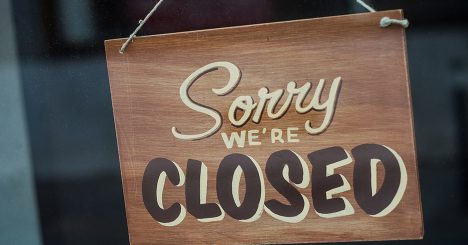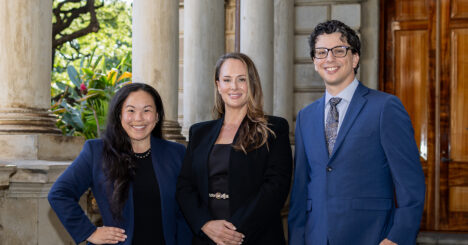With the COVID-19 pandemic causing many Hawai‘i businesses to close or dramatically reduce their operations, many have filed insurance claims seeking coverage for “business interruption.” But can they get coverage? Unsurprisingly, this question is one of the hottest topics in insurance litigation.
Many commercial property policies contain “business interruption” insurance coverage. This form of insurance protects against economic losses, including lost revenue, that occur when property damage causes a business to be unable to operate.
If a business desires to claim business interruption coverage based on a COVID-19-related closure, it must satisfy the specific language of its particular policy. Because many insurers use standard forms, however, many businesses seeking COVID-19 business interruption coverage have encountered the same two hurdles. First, there is a common requirement that the business interruption losses must be caused by direct physical loss or damage. Second, many policies include a “virus exclusion.”
Do COVID-19 Shutdowns Cause Physical Loss or Damage?
Business interruption clauses typically state that they cover actual losses from the suspension of operations caused by a direct physical loss of or damage to the property. Some policies also have “civil authority” clauses that expand coverage to address the situation where there is damage to nearby property other than the insured’s property that causes a civil authority to prohibit access to the insured business.
Thus, a key issue is whether COVID-19 has caused “direct physical loss or damage.” Many insureds have argued that COVID-19 “physically alters” the premises because the virus can remain contagious on surfaces for days, and because it can then spread easily within a contaminated business. It follows, the insureds argue, that coronavirus-related losses are caused by direct physical loss or damage. Some insureds have relied on non-COVID cases in which courts have held that discharge of dangerous gas or vapor into a building can inflict a direct physical loss if the buildings are rendered uninhabitable. Other insureds have argued that governmental “stay-at-home” mandates to combat COVID-19 were issued in response to dangerous physical conditions, satisfying the physical loss requirement.
Insurers, however, have pointed out that shutting down because of a fear of person-to-person spreading, or contamination of surfaces, is different than situations like ammonia actually leaking into a building. Insurers have also pointed out that many of the businesses seeking insurance have suspended operations due to government orders and economics, not the discovery of coronavirus contamination on surfaces within the business. Insurers argue that prophylactic measures based on fear of future harm do not trigger coverage under the “civil authority” clauses (which, as set forth above, generally require a civil authority to prohibit access due to physical damage to other nearby property).
Few courts have ruled on the “direct physical loss” requirement in COVID-related business interruption claims. Most that have issued such rulings agree with insurers. For example, a District of Columbia court rejected a group of insured restaurants’ arguments that a government-mandated shutdown triggered their business interruption coverage. In Rose’s 1, LLC v. Erie Ins. Exchange, No. 2020 CA 002424 B (2020), the District of Columbia Superior Court held in an August 6, 2020 order that the “loss” had to directly impact the restaurant properties themselves, and that the shutdown order, in itself, did not cause such an impact. The Court also noted that the restaurants offered no evidence that the virus was present at their specific properties.
Some courts, however, have been more favorable to insureds on this issue. In the Missouri federal court case Studio 417, Inc. v. Cincinnati Ins. Co. No. 20-cv-03127-SRB (2020), a hair salon’s business interruption claim was based on being forced to suspend their business due to mandatory COVID-19 shutdowns. When the insurer declined coverage, the salon sued in federal court. The salon alleged that over the last several months, it was “likely” that customers, employees, and/or visitors to its business were infected, that the coronavirus “is a physical substance” that “lives on,” is “active on inert physical substances,” and is “emitted into the air.” As a result, the salon alleged, the physical property “in their vicinity” was “unsafe and unusable,” and they were “forced to suspend or reduce business at their covered premises.” The federal court, in an August 12, 2020 order, held that these and other allegations–if later proven true–would adequately demonstrate a loss for purposes of its business interruption coverage. The Court noted that a business may suffer a physical loss when its property is uninhabitable or unusable for its intended purpose.
Does a “Virus Exclusion” Exclude All COVID-19-related Coverage?
Even if an insured can prove COVID-19 caused a physical loss or damage, another potential obstacle is a “virus exclusion” clause that insurers may include in their standard policy forms. A virus exclusion typically excludes coverage for damage caused by or resulting from any virus. Such exclusions were added to some policies in response to the SARS pandemic in the early 2000s.
Some insureds have attempted to sidestep the virus exclusion by arguing that the government shutdown orders caused their businesses to close, not COVID-19 itself. Some early court rulings, however, have rejected this argument. For example, in the Texas federal court case Diesel Barbershop, LLC v. State Farm Lloyds, No. 5:20-cv-00461-DAE (2020), the judge concluded that “it was the presence of COVID-19 . . . in Texas that was the primary root cause of Plaintiffs’ businesses temporarily closing,” and therefore the virus exclusion applied. Notably, the Studio 417 case described above did not involve a policy with a virus exclusion.
None of these cases definitively answer the question of whether COVID-19 can or should trigger business interruption coverage, and the law will continue to evolve as more lawsuits are filed, and as insurers and insureds appeal adverse decisions to the higher courts. In Hawai‘i, no court appears to have issued definitive rulings on this issue as of late August 2020. One thing, however, is clear: much like COVID-19 itself, the issue will continue to affect businesses (and their insurance carriers) for years to come.
Will Legislative Responses Affect Business interruption coverage?
Finally, amid the wave of litigation over business interruption coverage, legislation has been introduced in several states and Congress to deal with the economic and business fallout from the coronavirus pandemic. Some such legislation seeks to compel insurers that provide business interruption coverage to insure losses resulting from the coronavirus pandemic–regardless of whether policies contain physical damage requirements or virus exclusions. No similar legislation has been introduced in Hawai‘i.
As of August 2020, no such legislation has been passed and become effective. It is almost certain, however, that if this legislation is enacted, insurers will challenge the constitutionality of being required to cover certain losses despite policy exclusions stating otherwise. The political and legal controversy over such legislation is not likely to end anytime soon.
This article was published as part of the Fall/Winter 2020 issue of ke kumu, Cades Schutte’s client newsletter. Read the full article of ke kumu, which explores some of the laws unique to Hawaii.





